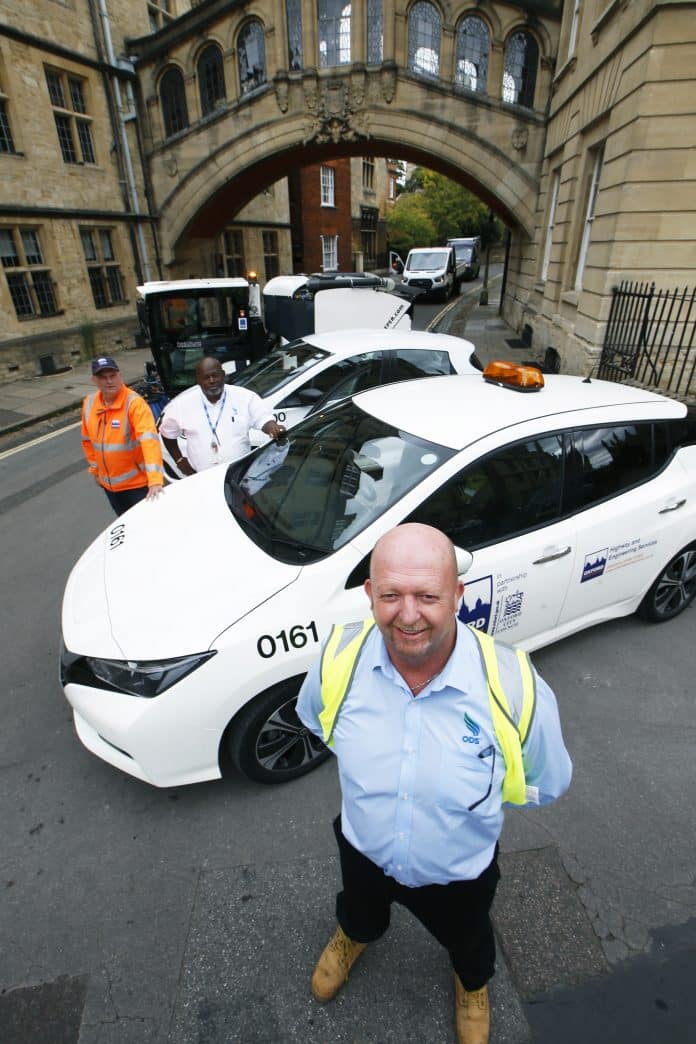ODS, Oxford’s Local Authority Trading Company (LATCO), has won a grant to collaborate with Oxfordshire County Council (OCC) to develop an innovative and cost-effective device that could be a real game-changer in allowing households without off-street parking to charge Electric Vehicles (EVs) at home.
Oxfordshire is ahead of the UK curve in its transition from petrol and diesel vehicles to cleaner, greener electric vehicles, with around 4000 electric and ‘ultra-low emissions vehicles’* currently on its roads. EV uptake is set to soar in the next five years in Oxfordshire, but a lack of suitable EV charging can be a barrier, especially for the estimated 30-40% of Oxfordshire residents who have no access to off-street parking and can’t install a home charger.
Cable gullies provide a refreshingly affordable and deceptively simple solution to this problem. They provide a discrete and safe channel for charging cables to extend from homes to roadside, without causing a trip hazard to the public or adding to street clutter. Connecting to a household’s own electricity supply means charging is cheaper and more convenient than using an on-street charge point, and also means that residents with solar panels can charge their EVs directly from their own renewable energy supply.
About the project
The £160,000 funding has been awarded by Innovate UK, part of UK Research and Innovation, a non-departmental public body which supports businesses to develop new ideas which drive productivity and economic growth.
The funding will enable the joint team to build on the cable gully concept originally piloted in Oxford as part of Go Ultra Low Oxford, a project led by Oxford City Council in partnership with Oxfordshire County Council, and funded by the Office for Low Emission Vehicles (OLEV).
The design will build upon the learnings of the Go Ultra Low Oxford, a trial of ‘global significance’, which trialled five different charging technologies for 18 residents across Oxford. Phase 1 of the trial found that whilst there is no ‘one size fits all’ solution for on-street charging, but that the combination of a home charger and simple cable gully solution was the cheapest, most highly utilised solution, as well as the one least likely to elicit complaints from neighbours.
ODS will lead on the design of the new solution, while Oxfordshire County Council’s award-winning IHub Innovation Team will lead work to explore how new EV charging solutions can be funded sustainably in the future, and develop the processes and policies to roll the new solution out across Oxfordshire and further afield.
The project, which commenced in October 2020, will run until March 2021 and pave the way toward a potential larger-scale pilot of the cable gullies in the future.
Oxfordshire County Council and Oxford City Council are proposing to create a Zero Emission Zone (ZEZ) in Oxford city centre in 2021, which aims to reduce Oxford’s toxic air pollution levels, tackle the climate emergency, and improve the health of residents, workers and visitors in Oxford and beyond. The Zero Emission Zone is part of a wider local transport plan which aims to improve connectivity, reduce emissions and support sustainable growth across Oxford and Oxfordshire.
The Ox Gul-e project is the latest in a suite of projects putting Oxfordshire at the forefront of innovation in EV charging; the IHub’s county-wide Park and Charge, VPACH and Vehicle to Grid Oxfordshire projects are piloting over-night charging hubs for drivers without off road parking, new models for EV charger ownership, and the potential for EV fleets to support the grid through acting as energy storage units.
Local Energy Oxfordshire is exploring how local renewable energy and EVs can play a part in new energy systems, and the Energy Superhub Oxford led by Pivot Power in partnership with Oxford City Council and ODS will see large scale battery storage supporting a super-rapid EV charging hub in Oxford.
Commenting on the award, Sophie Hearn, Head of Infrastructure, ODS, said “Winning this grant is recognition for the practical approach to creativity we take at ODS. It’s a real coup and will make a difference to decarbonising Oxford.”
She adds, “This development will be a great example of frugal innovation in action, allowing people to do more with less. Demand is rising for EVs, yet one in three of us can’t easily charge a car from home. We’re developing a deceptively simple solution which will immediately open up the choice of EV ownership to millions more. The phrase ‘game changer’ is bandied about all too often, yet this discreet option could significantly increase EV uptake.”
Cllr Yvonne Constance, Oxfordshire County Council’s Cabinet member for Environment, said: “Providing an effective EV charging solution for residents without off-street parking is a key part of ensuring that Oxfordshire’s transition to lower carbon transport is inclusive and accessible. Having had such a positive response from residents using the cable gully solution in the Go Ultra Low Oxford project, we are really excited to explore the potential for this to be rolled out as a scalable product, and something that we can be proud has been developed and trialled in our innovative region.”
Cllr Tom Hayes, Deputy Leader and Cabinet Member for Green Transport and Zero Carbon Oxford, Oxford City Council, said: “We welcome the start of this new project in the city to help transform electric vehicle charging. Oxford is once again leading the way.
“With the development of electric vehicle charging solution involving gullies, Oxford is coming up with a solution to the problem that households tend to be unable to charge an electric car because they lack access to private, off-road parking.
“We’re thrilled that the project will be drawing upon the pioneering work of the Go Ultra Low On-Street charging project led by Oxford City Council. I am looking forward to seeing how the project will draw on the learnings of the project to deliver a solution to EV charging challenges for everyone in Oxford. For those households which need to use vehicles, we want them to operate electric vehicles, and that means home-charging which can be accessible to all without off street parking.”




